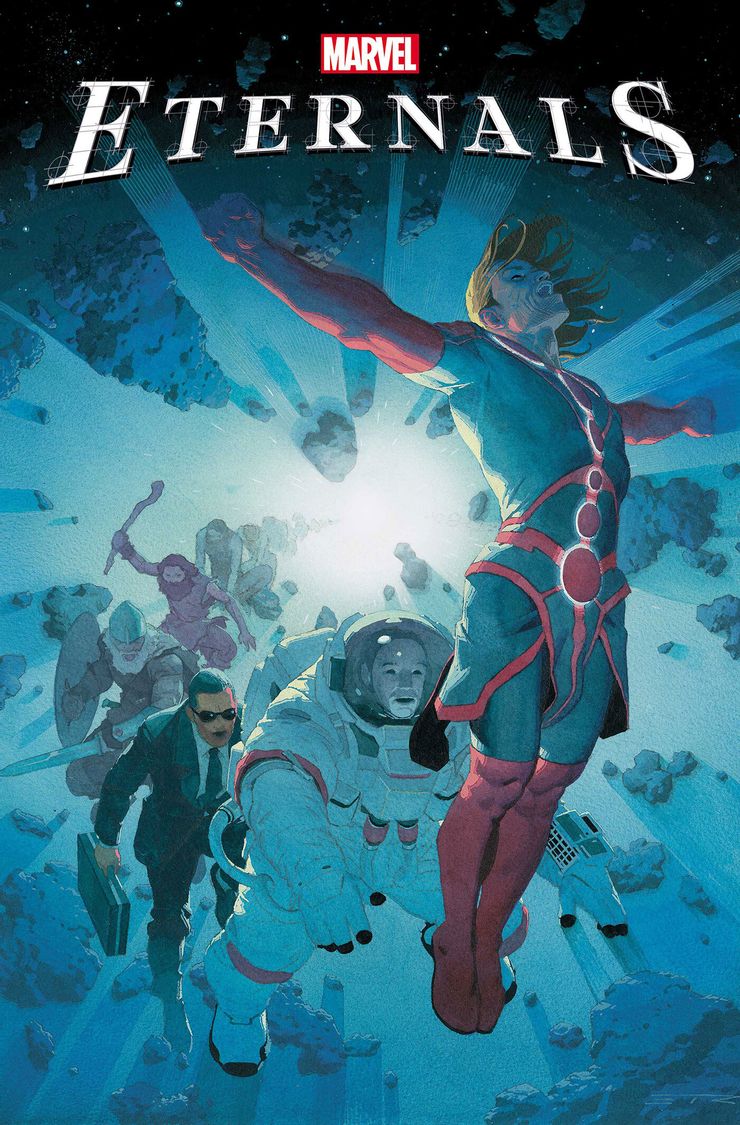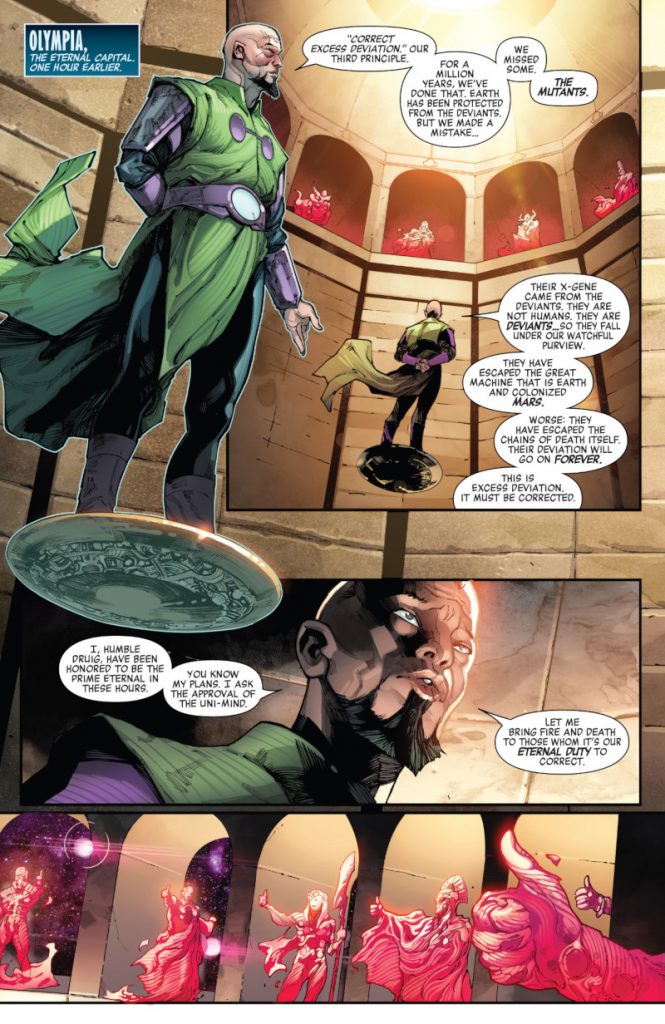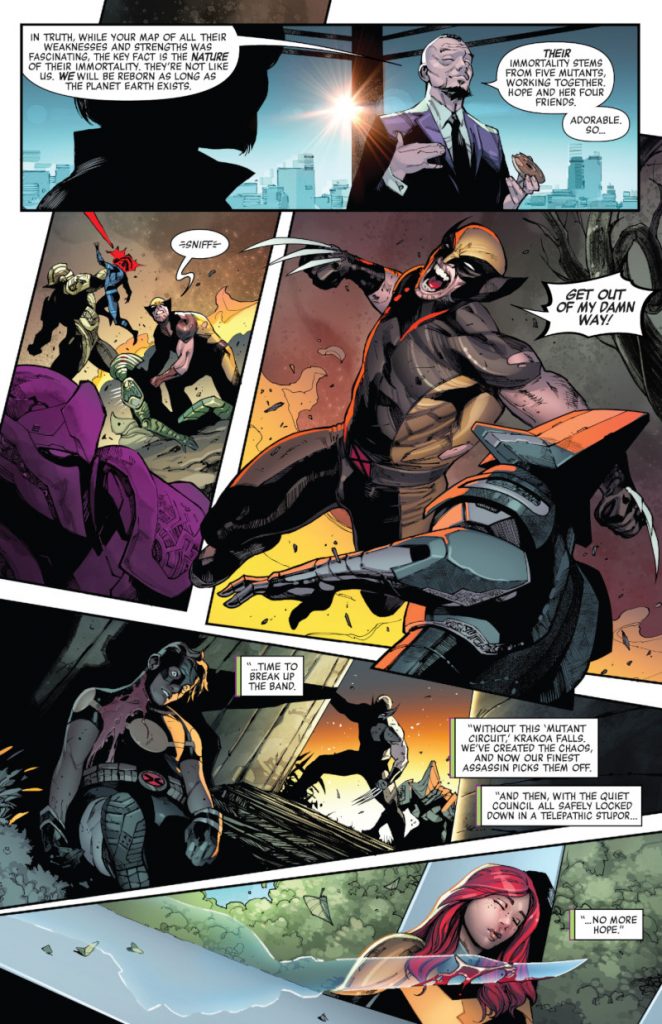Everyone is Important: On Judgment Day at the Half, and Why It’s Thriving
I love event comics.
I know what you might be thinking. “Who loves event comics?!” I get it, too. Events are immensely polarizing, often seemingly designed to generate surging revenue as much as impactful narratives. Readers suffer from “event fatigue” on the regular, as we’re constantly told of how “nothing will ever be the same” while being given little of that on the page. The number of good, memorable events in the past decade from DC and Marvel combined is arguably outdistanced by those that failed to live to those standards.
I know all of this.
And yet, I still love event comics! The potential for greatness in the form is there, if only because they can tell universal stories at a scope and scale that most superhero tales cannot if done right. They’re designed to involve everyone and everything in a way that is difficult to do in an individual title. When creators are given room to do their thing within that environment, “nothing will ever be the same” is just one of the potential outcomes. The ceiling isn’t just universal impact; it’s an incredible story with the weight of an entire line behind it. Not every event works. But when they do, it’s remarkable. That’s why hope springs eternal for me and that oft maligned story type.
Or, when it comes to the current Marvel event A.X.E.: Judgment Day, perhaps I should say “hope springs Eternal.” 26
From its earliest days, I had high hopes for this Kieron Gillen written, Valerio Schiti drawn, Marte Gracia colored, and Clayton Cowles lettered line-wide event. It was an extension of Gillen’s time on Eternals with artist Esad Ribic and Immortal X-Men with artist Lucas Werneck, and one that made sense in theory. You could see roots there. But roots are meaningless without effective execution. If it didn’t deliver, Judgment Day wouldn’t be the first event to never extend beyond the “in theory” of it all.
The good news is the execution has been there. In fact, now that we’re halfway through the main event itself — with the fourth issue arriving this week, 27 along with assorted tie-ins — I’d argue that Judgment Day has the potential to be the finest top-to-bottom line-wide event 28 since 2015’s Secret Wars, and maybe even Blackest Night or Secret Invasion before that. And it’s doing it in its own way, as Gillen, Schiti, and the rest of the creators involved have found new paths to building drama while still maximizing the impact of all our favorite event-specific beats.
There was a version of this piece that was more of a straight review, but to be honest, I have too many thoughts about this event to contain it to a structure with a single through-line like that. So, taking the lead from Gillen himself, I made the structure work for me. That’s why this isn’t a review of Judgment Day, but a look at ten essentials to its success, and how subtle tweaks to the event formula made all the difference in the world in terms of impact.
That said, some spoilers will appear, so if you’re not caught up with this event as of Judgment Day #3, I’d advise against reading this.


Starting With a Lead
The best superhero events build organically from other in-universe stories, culminating in a larger tale that doesn’t just feel willed into existence, but like it’s a natural continuation of what preceded it. Arguably the strongest period for that was the mid-Aughts to early-2010s at Marvel, as writer Brian Michael Bendis and others threaded disparate storylines for the better portion of a decade. 29 While some would disagree, Marvel’s line thrived during that stretch because it felt as if it belonged to a common narrative.
Marvel events have struggled at many things, but if I had to pick the biggest issue, it’s that they largely do not feel rooted in universal stories. Now, you could argue that Bendis-fueled stretch was the outlier for the form rather than recent efforts. You might not be entirely incorrect if you do. But it still often feels as if these stories exist because they need to rather than because they are part of the natural course of a larger narrative. The closest these stories have gotten to building off something else of late is when they’re born from a single title — like the recent Devil’s Reign coming from Daredevil or King in Black from Venom — but those typically don’t feel like events as much as stories expanded beyond the confines of a single title for sales and marketing purposes.
That’s where Judgment Day differs. It doesn’t spin out of a single story.
It spins out of two!
That might sound like a cheat to make a point by yours truly, but it’s genuinely an essential difference maker here. Two of the most notable stories in recent years at Marvel have been the larger Krakoan narrative and what Gillen and Ribic have been doing in Eternals. Those efforts have done many things well, but most crucially, they’ve reframed each group’s respective relationship with death. With the discovery of the cost of Eternal life — every time an Eternal dies, they are resurrected at the cost of a human life — and Krakoan resurrection being publicized coming over a short period, those make ideal points of narrative tension together. And Gillen was writing the flagship title for both lines.
Pair that with the fact that the Avengers currently reside in an actual Celestial, one of the gods in Eternals culture, and you have the perfect recipe for an organically built event. While I’m not a fan of the A.X.E. moniker tacked onto the Judgment Day title, each of the groups that make up that part of the name have skin in this game. That’s important, and acts as the foundation of this event, building off the stories already taking place in those lines. It’s all connected.
And the value of that cannot be underrated.


Reducing the Learning Curve
The trouble with the previously noted approach is an event isn’t just designed to be universally important. It’s meant to be a blockbuster story that everyone can enjoy. Those two pillars have a natural tension to them. Building from the past and being open to everyone can be contradictory goals. Contradictory, but not impossible to balance, if handled with care. 30
And Judgment Day has been unusually clever in its approach to building from the past while still being accessible.
That’s best showcased in a small selection of pages from the first issue — in which Druig, the Prime Eternal, gains the Uni-Mind’s blessing to attack Krakoa, and the following effort that focuses on destroying the mutant circuit powering resurrection — which walk us through the core details behind the entire story. There’s more to it, of course. But Gillen and Schiti give readers everything they need to know about who is involved and why this is happening through action alone. It’s action as exposition — or actsposition, as some might say 31 — effectively delivering key information within the flow of the story while still giving us our desired blockbuster delights.
That’s every event’s goal, of course. It’s the form’s equivalent of having your cake and eating it too. But not everyone succeeds as well as this team does. Even more impressively, I’d like to note, Gillen doesn’t just do this once. He does it twice. The prelude comic Eve of Judgment 32 somehow hits extremely similar beats to Judgment Day #1 in a completely different way that is equally enjoyable without feeling repetitive. It’s a heck of a thing.
subscribers only.
Learn more about what you get with a subscription
Please keep reading after that.↩
Which I have not read yet, as a person that isn’t blessed with advance review copies from Marvel.↩
By that I mean an event that encompasses not just a section of a universe, like the upcoming Dark Web crossover with Spider-Man and the X-Men. It has to be enough to cover the broader universe and have tie-ins from regular, otherwise unaffiliated titles.↩
From 2004’s Avengers Disassembled to 2010’s Siege.↩
It’s possible to go the other direction too. Brute force info dumping is an option as well. But that can feel inorganic in a way that destroys the narrative.↩
No one says that.↩
Or Eternals #13, as I call it in my head.↩
Please keep reading after that.↩
Which I have not read yet, as a person that isn’t blessed with advance review copies from Marvel.↩
By that I mean an event that encompasses not just a section of a universe, like the upcoming Dark Web crossover with Spider-Man and the X-Men. It has to be enough to cover the broader universe and have tie-ins from regular, otherwise unaffiliated titles.↩
From 2004’s Avengers Disassembled to 2010’s Siege.↩
It’s possible to go the other direction too. Brute force info dumping is an option as well. But that can feel inorganic in a way that destroys the narrative.↩
No one says that.↩
Or Eternals #13, as I call it in my head.↩
Shouts to Kumail Nanjiani for the excellent line read in Eternals.↩
Albeit with factions that aren’t on the same page as leadership.↩
At least not entirely.↩
Wouldn’t that be a twist!↩
I’m not counting Marvels here, because that was a bird of a much different feather.↩
While it’s outside of the main story, we even get similar insight into one of The Hex — Syne the Memotaur is very interested in poetry — in Death to the Mutants #2, revealing that even relatively faceless monsters have more to them than burning mutants. Some also have nuanced thoughts on Sylvia Plath! This truly might be my favorite part of the event.↩
Druig understands that a key to winning friends and influencing people is to make them feel special.↩
As he consumes a bagel, bolstering his villainy thanks to the casual nature of his genocidal plans.↩
Although X-Men Red #5 was so good you’d be doing yourself a disservice by missing it.↩
Shouts to Eve of Judgment, the prologue issue to this event that’s arguably inessential but an absolute treat of a read.↩
My guy is an arrow with some serious beef.↩
Please keep reading after that.↩
Which I have not read yet, as a person that isn’t blessed with advance review copies from Marvel.↩
By that I mean an event that encompasses not just a section of a universe, like the upcoming Dark Web crossover with Spider-Man and the X-Men. It has to be enough to cover the broader universe and have tie-ins from regular, otherwise unaffiliated titles.↩
From 2004’s Avengers Disassembled to 2010’s Siege.↩
It’s possible to go the other direction too. Brute force info dumping is an option as well. But that can feel inorganic in a way that destroys the narrative.↩
No one says that.↩
Or Eternals #13, as I call it in my head.↩
